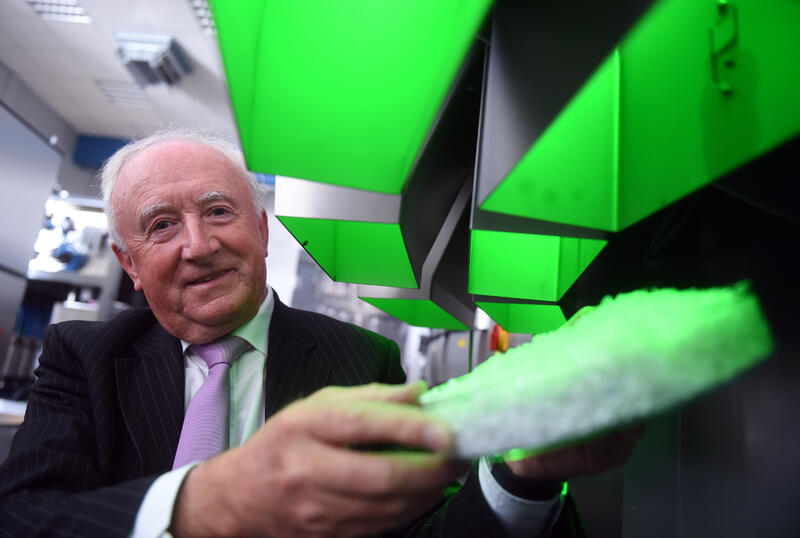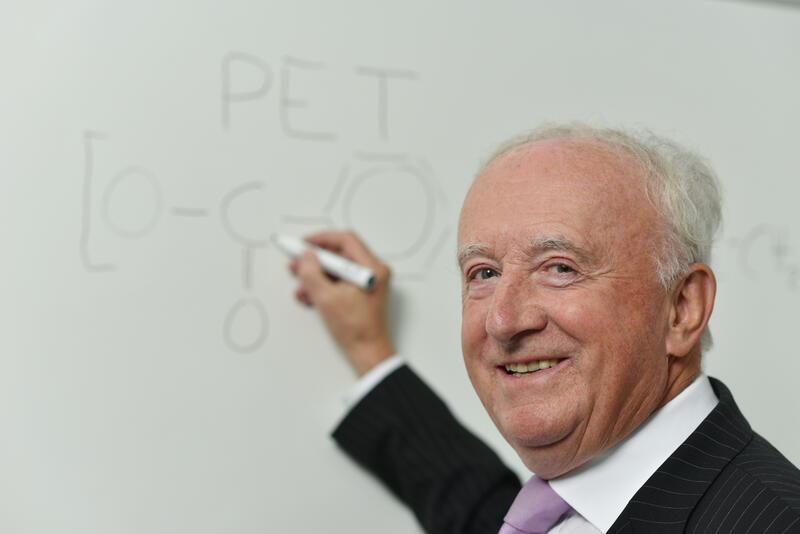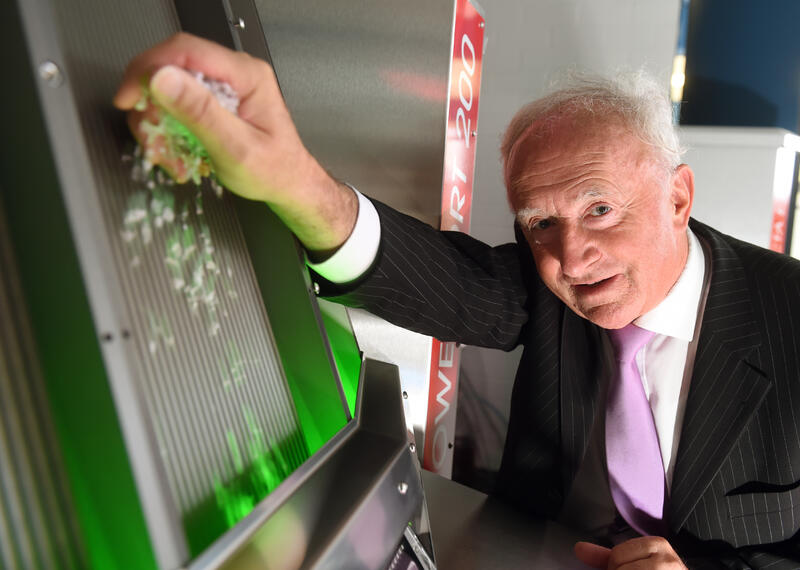“Measurable Milestones”: Visionary sets news standards in the recycling of plastics
“With his innovative, internationally unique measuring and analysis systems, Krieg turns his vision of curbing the worldwide squandering of valuable resources into reality. With commitment and courage, he has dared to take the step from science into business and has set milestones in the integration of production and environmental conservation. Using his revolutionary procedures, valuable synthetic materials can be recycled at a higher quality, so that, for example, chemicals employed in offset printing can measured out much more precisely, allowing a reduction in the amount consumed – greatly easing the burden on the environment and offering a promising perspective for the future.” - This is how Dr. Heinrich Bottermann, General Secretary of the Deutsche Bundesstiftung Umwelt (DBU), today announced the presentation of the 2014 German Environmental Award to the founder of the company UNISENSOR Sensorsysteme (Karlsruhe), Prof. Gunther Krieg (72). German President Joachim Gauck will hand Krieg the prize in Karlsruhe on 26 October. The prize money: 245,000 euros.
Recycling of valuable resources from plastic waste worldwide
Bottermann described how Krieg had researched the optical analysis of materials during his scientific career at the University of Applied Sciences in Karlsruhe. Even before the founding of UNISENSOR in 1990, Krieg had realised projects involving the transfer of technology from the scientific to the practical field at the Karlsruhe Institute of Technology and the Steinbeis Innovation Center Optoelectronics and Sensors, which he has headed since 1980, according to the DBU General Secretary. During his time at the university, he had already engaged with the question of how valuable resources could be won back from the huge amounts of plastic waste produced worldwide. “With his outstanding technological flair and untiring passion for new developments, Krieg makes a major contribution to reducing the wasteful consumption of mineral oil, a finite resource that is needed to produce plastics, to save it for those fields where it is still necessary and at the same time curbing the damaging effects of plastic waste in waterways, oceans and the world's ecosystems,” Bottermann said.
Measuring and analysis system detects alien substances in PET returnable bottles
In the year his company was founded, Krieg had developed a unique system of measurement and analysis to trace foreign substances in returnable bottles made of polyethylene therephthalate (PET), Bottermann said. He said impurities such as petrol, oil, cleaning and washing agents were reliably detected using an online optical analysis method, allowing contaminated returnable bottles to be safely recognised and weeded out. Thanks to this technology, he said, plastic bottles that fulfil the high standards of purity in the food and beverage industry could be reused, thus closing material cycles and greatly enhancing the efficient use of energy and resources.
Analysis and sorting technology for PET recycling of disposable bottles
Since 2009, a versatile and highly effective analysis and sorting technology for PET recycling of disposable bottles has been very successfully put on the world market, Bottermann said. He described how, after used PET packaging has been processed into small particles, the sorting system POWERSORT 200 detects foreign substances such as polyvinyl chloride (PVC) or nylon, and foreign materials such as silicone or contaminated particles, and separates them out very rapidly. Up to a million analyses were carried out per second, and foreign particles blown out of the PET stream, according to Bottermann. Then the pure PET particles could be melted and used again to produce PET drink bottles, he said. He said this system was unique worldwide, as no sorting technology of the same effectiveness was available to facilitate the reuse of recycled PET for the food and beverage industry.

© Uli Deck/DBU

© Uli Deck/DBU
Disposable bottles still dominate the global beverage market
This innovative procedure was less energy and resource-intensive than producing bottles from new PET, Bottermann said, and made a great contribution to climate protection. The machine could process up to three tonnes of PET per hour – with an accuracy of up to 98 percent, according to Bottermann. He said that more than 30 units had been sold so far, which corresponded to 650,000 tonnes of PET recycled per year. He pointed out that altogether 1.2 million tonnes of the fossil resource oil was saved, and that three tonnes of greenhouse gases were avoided per tonne of recycled PET. The wide-spectrum measuring procedure offered future security to recycling companies, he said, because this highly effective technology could solve even those sorting demands that could arise in the future. Bottermann: “The value of this pioneering development becomes clear when one considers that the proportion of PET in beverage packaging worldwide is already much higher than 50 percent. To this day, disposable bottles dominate the global beverage market. For this reason, we urgently need high-quality recycling procedures for these waste streams.” Other plastic types besides PET could also be recognised and sorted out, he said. At present, the team associated with Professor Krieg was developing a prototype that analyses and sorts plastics from crushed used electronic devices such as computers and cars, he added.
Further field of application: environmentally friendly machines for offset printing
Another field where UNISENSOR technologies could be applied was in machines for offset printing, Bottermann said. Krieg's measuring and make-up system helped printing machines to save resources and operate more economically, he said. Previously, he explained, print cylinders had to be moistened with a mixture of water and chemicals to work smoothly – with ecologically damaging alcohol being also used for most processes. To prevent the increase of impurities in the water, it had to be regularly replaced by fresh moistening agents and disposed of. By precisely measuring the ingredients in the water using ultraviolet rays (UV), only the chemicals that were lacking could be made up, so that overall less of them could be used. The addition of alcohols was rendered unnecessary. “By the additional use of special membrane filters, the dirty water is purified again, and overdoses no longer enter the environment,” Bottermann said.
Future goal: Measuring chemical impurities in sewage plants
Bottermann described one of the next goals of this “committed visionary” as being measuring chemical impurities in sewage plants online – if Krieg succeeded in doing this, Bottermann said, he would set “another milestone in history”, pointing out that residues of medications in water were becoming a growing problem for humans and the environment. He said the first online system had been installed some time ago in a water works near Karlsruhe, and that it very successfully measured the purity of the drinking water using spectroscopy on the basis of UV rays.
UNISENSOR active across the world
Today, UNISENSOR is active on a worldwide basis, especially in America and Latin America. In 2013, a subsidiary was founded in Atlanta. Its customers include large international companies from the beverage, gas and plastic recycling industry as well as more than 1,500 offset printing companies. Krieg's highly innovative measuring and regulating systems were still unique worldwide, Bottermann said, which was a proof of their outstanding technological quality. “Krieg has proven several times that medium-sized companies can operate successfully worldwide,” the DBU General Secretary said. “With his passion, his boy-like curiosity and his courage, Krieg has a great role as a model for young company founders. His successful lifetime achievement shows that it is worthwhile holding on to visions to make the world a little bit better.”

© Uli Deck/DBU